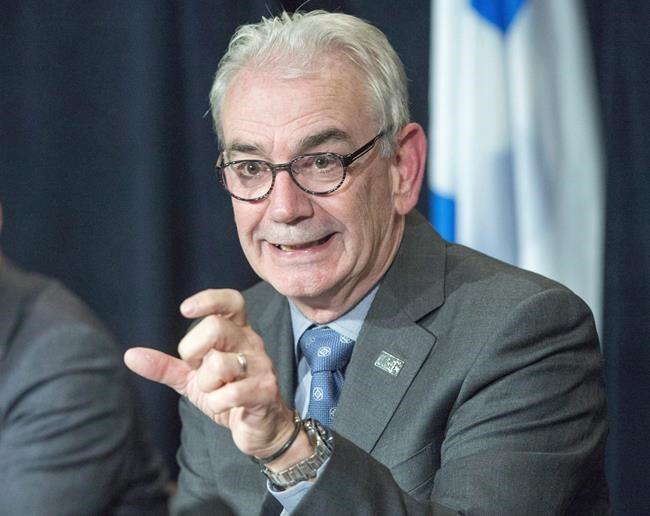MONTREAL — Quebec's anti-corruption unit has taken another hit to its credibility after details of a court ruling released publicly this week said the former head of the police force derailed a high-profile fraud trial by orchestrating leaks to the media.
Judge André Perreault of the Quebec court wrote that Robert Lafrenière was behind sensitive leaks to journalists in an effort to pressure the provincial government in 2016 to renew his mandate as head of the anti-corruption squad, known as UPAC.
Lafrenière has denied those claims, but in Quebec City on Tuesday, opposition parties took turns criticizing the police force for its latest scandal. Liberal Leader Dominique Anglade agreed with a reporter's assertion that the anti-corruption unit has turned into a "political police force."
"It's extremely problematic everything that we have read in relation to the UPAC," Anglade said in Quebec City.
"What's clear is that inside UPAC there really are issues, and you can't sit in your living room today and watch this and think that (you) have confidence in this institution."
The details released this week were contained in a September 2020 court ruling involving ex-deputy premier Nathalie Normandeau, who was granted a stay of proceedings along with five other co-accused due to unreasonable delays in their fraud case. Much of the 81-page ruling had been subject to a publication ban until several media organizations were able to have it lifted Monday.
In the mostly unredacted decision, Perreault reproached Lafrenière and other senior members of the police force for "serious misconduct" that he said was largely responsible for delays in Normandeau's case.
"Those who orchestrated and participated in the leaks of evidence in this case, who helped to protect the authors, should know or should have known that the delays that were going to result from their actions were going to compromise the rights of all the co-defendants of being judged within a reasonable time,” Perreault wrote.
Lafrenière, who resigned on the day of the provincial election in 2018, denied he leaked any information in a recent interview with La Presse, telling the news organization "at no time did I orchestrate any leak whatsoever to advance my personal interests."
Perreault, in his ruling, endorsed the conclusions of Michel Doyon, an investigator with Quebec's police watchdog, who found that Lafrenière was behind the leaks "for the purpose of his renewal as commissioner of the UPAC and the creation of UPAC as a specialized police force."
Doyon's investigation found that "certain leaks or investigative strategies by UPAC (were) synchronized with key dates on the political agenda" of the legislature.
UPAC launched its own investigation into the source of the leaks. But Perreault said that was a "bogus investigation" that encouraged Quebec prosecutors to follow false leads. Perreault said the police force targeted innocent people to distract prosecutors from the force's leadership, who he said were responsible for leaking the information.
Quebec's police watchdog, the Bureau des enquêtes indépendantes, was also investigating the leaks to the media. The watchdog, Perreault said, had linked 19 leaks to UPAC brass, including six to Lafrenière. The BEI investigation is ongoing, and at the time ruling was rendered in 2020, Doyon was still to meet with 35 witnesses.
Aside from Normandeau, ex-premier Jean Charest — now a candidate for the leadership of the Conservative Party of Canada — was the target of leaks. Details of UPAC's investigation into alleged illegal party financing involving the Quebec Liberal Party under his leadership were distributed to journalists. That investigation has been closed and no charges were laid.
Aside from this latest scandal, UPAC has been criticized for not building cases leading to successful prosecutions. A government report in 2019 found it lacked officers with the necessary skills to conduct complex investigations into financial crimes.
On Tuesday, Québec solidaire's Manon Massé said it was time for UPAC to demonstrate it could do what it was mandated to do. "UPAC has not demonstrated that it could … meet its responsibilities, to assure the people of Quebec that corruption is … hunted down and is penalized," Massé said.
Parti Québécois Leader Paul St-Pierre Plamondon said it was time for UPAC to be scrapped altogether.
"We have an issue of trust now because it says that for years all this was theatre," St-Pierre Plamondon said. "So, how can you continue with that organization if culturally speaking, the organization as a whole was in a business of theatre? You can't trust them."
Public Security Minister Geneviève Guilbault, speaking in Rimouski, Que., reiterated her confidence in the institution, noting that much had changed since the Coalition Avenir Québec came to power and the new head of the unit, Frédérick Gaudreau, was elected by the legislature.
"Let UPAC do its work," Guilbault said.
This report by The Canadian Press was first published May 31, 2022.
— With files from Pierre Saint-Arnaud and Sidhartha Banerjee.
The Canadian Press
Note to readers: This is a corrected story. A previous version said the 2020 court ruling involving ex-deputy premier Nathalie Normandeau was heavily redacted.



